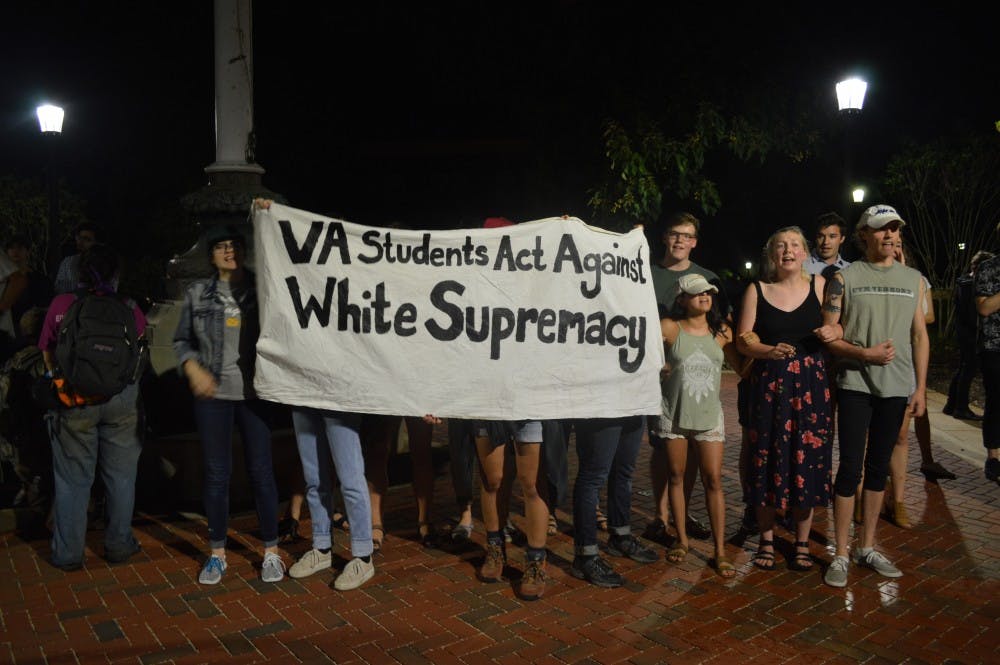I spent the summer welcoming new students to the University. Among the many activities I helped facilitate were conversations with the Dean of Students about acceptance, civil discourse and diversity. We held a program entitled “I Am UVA,” where students shared their unique stories of fitting into the University community and finding a home at University, regardless of their background. Incoming students consistently said they were more confident and excited to attend the University after these sessions, and they were less nervous about not fitting into the different stereotypes they may have heard about Virginia. But now, two weeks after leaving these positive experiences of community building, three people are dead and dozens injured in the aftermath of clashes between white supremacists and counter-protesters.
These clashes didn’t take place far away. They happened in Charlottesville, the town which hosts the University and offers so many a quiet, peaceful town to reside in; full of good places to eat and events which bring the community together, such as University basketball games or concerts downtown. Neo-Nazis weren’t marching in Blues Brothers or a documentary, they were marching in Charlottesville. Clashes between fellow citizens of the United States weren’t happening in black and white footage from 50 years ago, they were happening in Charlottesville, before our very eyes. A car didn’t drive through a crowd in France or England motivated by religious extremism, it drove through a crowd in Charlottesville, motivated by a twisted ideology that some human beings are somehow superior to others.
How does one react to this? How am I supposed to react to this, as a Jewish male who wears a yarmulke on his head every day to show his faith? How am I to react to neo-Nazis and white supremacists walking on the Grounds of my University, the place I call home and love so dearly? How do I respond to individuals bearing torches and wearing shirts quoting Adolf Hitler, the man who orchestrated the mass killing of my people, in the place that I was just telling incoming students had welcomed me with nothing but acceptance and love? What do I tell those incoming students who are now texting me, terrified to move into their dorms next week for their first year of college?
A feeling of utter powerlessness came over to me today, as it did, I’m sure, for many of my classmates and indeed many around the country. But we should never feel absolutely powerless. If we are powerless to sway the minds of those who would spread hateful and racist ideology in our communities, we are certainly not powerless to support those that would be attacked by white supremacists. We are not powerless to strengthen and educate our communities about hate speech and those that would sow unrest and divide us. During the summer, the Dean of Students, Allen Groves spoke to students on the importance of countering hateful speech and disgraceful rhetoric with speech of our own. Never has that message been more important and more vital for the University community than right now.
We must, as a community, come together as one. We must set aside differences on policy issues. We must put aside the divides which may occur due to race, economic status, life experience or more. We must come together and present a united voice, a voice which screams our pride in our democracy, and the freedoms and protections it offers each of its citizens. A voice which yells in its celebration of our diversity as a University and as a city. A voice which tells the country and indeed the world that we will not bend at the knee to neo-Nazis or white supremacists, that we are stronger and more united than before they brought violence and terror to our beautiful college town.
That voice is already emerging. Be it from the statements from Virginia Gov. Terry McAuliffe, Charlottesville Mayor Michael Signer, University President Teresa Sullivan or several student groups which have already condemned the violence and called for calm and unity, a united voice and message is coming together in the wake of tragedy. The challenge of healing and repair in the wake of the day’s events is a massive one, but one I know the University community will respond to with passion. I am reminded of how this community has come together in the wake of tragedy and challenges before, be it with the Rolling Stone article, the kidnapping and murder of Hannah Graham, the Eliminate the Hate campaign in the wake of rising race-based incidents on Grounds and around the country or even this weekend, as the University was prepared to offer several events, including a peaceful discourse on the issues that the days presented. This community has unfortunately faced terrible challenges in recent memory, and this is yet another challenge for the University and Charlottesville to process and heal from. Let us continue to come together, to speak with a unified voice and remind all that Charlottesville and the University of Virginia will not stand for hateful rhetoric or violence and will respond in the most powerful way possible: by countering their hateful speech with our own speech of love, compassion, acceptance and unity.
Truman Brody-Boyd is a third-year College student.







